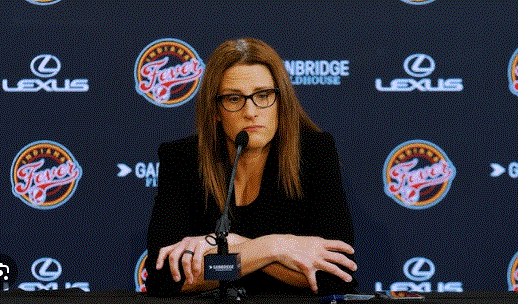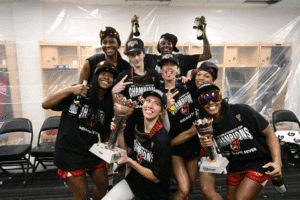
The Fever’s Triumph Over the Lynx Amidst Key Player Absence
In a recent Women’s National Basketball Association (WNBA) matchup, the Indiana Fever displayed remarkable resilience and skill as they secured a convincing victory over the Minnesota Lynx, winning 74-59. This triumph was especially noteworthy because the Fever achieved it without the presence of their star player, Caitlin Clark, who was sidelined due to a groin injury.

Clark, widely regarded as one of the league’s brightest young talents and a critical component of the Fever’s offensive strategy, was unfortunately unable to participate in this pivotal game. Despite her absence, the Fever’s roster stepped up impressively to fill the gap and deliver a strong performance that not only boosted team morale but also demonstrated their depth and versatility.
Key Contributions from Multiple Players
Without Clark on the court, the Fever relied heavily on the contributions of several other players who rose to the occasion. Natasha Howard led the team with 16 points, showcasing her ability to take control in critical moments. Following closely was Sophie Cunningham, who contributed 13 points, providing much-needed scoring and energy. Additionally, Aliyah Boston, Kelsey Mitchell, and Aari McDonald each chipped in with 12 points, making the scoring effort a well-rounded team endeavor.
This balanced offensive output was critical in overcoming the Lynx, a team known for its competitive defense and strong rebounding. The Fever’s ability to spread the scoring responsibility across multiple players prevented the Lynx from focusing their defensive efforts on a single target, which often proves to be a decisive factor in high-stakes basketball games.
Clark’s Social Media Reaction
Even though Caitlin Clark was unable to play, she remained actively engaged with the team and their fans via social media. After the game, Clark expressed her pride and excitement for her teammates’ performance on the social media platform X (formerly known as Twitter). Her enthusiastic message, “My girls did their thing!!!!!! So proud!! Lfggggg,” highlighted her support for the team and reflected her confidence in the players who stepped up during her absence.
Clark’s post not only reinforced her role as a leader off the court but also fostered a sense of unity and encouragement within the Fever’s fan base. Her engagement suggested that despite injury setbacks, she remains emotionally invested in the team’s success and motivated to return stronger.
Financial Incentives and Bonuses
One of the most notable aspects of the Fever’s victory was the financial reward that accompanied it. The roster secured a substantial bonus payout of $500,000 for the win, which is a significant sum in the context of professional women’s basketball, where salary structures often lag behind those in the men’s leagues.
Given that the Fever have 11 players on their roster, this bonus translates to approximately $50,000 per player, providing a meaningful boost to their earnings. This payday is particularly important considering the ongoing conversations around player compensation in the WNBA, where many athletes have advocated for better financial support and recognition of their contributions to the sport.
Caitlin Clark’s Criticism of the WNBA’s Pay Structure
While the $500,000 bonus was a cause for celebration within the Fever organization, it also sparked controversy and debate, notably from Caitlin Clark herself. On an Instagram Live video, Clark voiced her frustration about the disparity in prize money between the WNBA Commissioner’s Cup champions and the overall WNBA league champions.
Clark pointed out a seemingly illogical situation where the Commissioner’s Cup champions receive a larger bonus than the team that wins the WNBA Championship, which is the league’s ultimate prize. She said, “You get more for this than you do if you’re a champion. It makes no sense. Someone help… Cathy [Engelbert] help us out!”
Cathy Engelbert, the WNBA commissioner, is the person Clark directly called upon, urging leadership to address the discrepancy. Clark’s remarks highlight an ongoing tension within professional women’s basketball regarding equitable compensation and recognition for the highest achievements in the sport.
Comparison of WNBA Champions’ Earnings
To provide more context, the WNBA champions typically receive a bonus of around $20,000 each for winning the league’s title. When compared to the $50,000 bonus for winning the Commissioner’s Cup, this creates an apparent imbalance that many find puzzling and unfair. The WNBA Championship represents the culmination of the season and arguably the most prestigious accomplishment for any player or team, yet the monetary rewards seem disproportionate.
This financial arrangement has become a point of contention not just among players but also fans and commentators, as it raises broader questions about how the league values different competitions and achievements within its structure.
Public and Fan Reactions
The disparity in bonuses quickly caught the attention of WNBA fans and basketball enthusiasts, many of whom echoed Clark’s concerns on social media. Fans expressed outrage and disbelief that the Commissioner’s Cup champions earn more than the team that wins the full league championship, sparking widespread debate about fairness and the priorities of the league’s leadership.
Among the voices joining the conversation was Dave Portnoy, the founder of Barstool Sports, who commented, “Caitlin was hilarious all celebration long last night but maybe the dumbest thing the @wnba does is paying the champs of the commissioners cup more than the real champs.” Portnoy’s remarks highlighted the absurdity of the situation from a fan’s perspective and lent additional visibility to the issue.
Other fans chimed in with questions and statements that reflected frustration and confusion, such as, “How is that even possible?” and “She’s so right!!” These responses underscored the widespread sentiment that the league’s financial incentives need reevaluation.
Some fans also praised Clark for speaking out, with comments like, “Hats off to Caitlin for calling out the issue with the WNBA leadership,” showing support for her advocacy and leadership on matters beyond just on-court performance.
Broader Implications for the WNBA
This situation sheds light on several broader themes and challenges facing the WNBA today. One key issue is the ongoing struggle for greater financial equity within professional women’s sports. Despite increasing popularity, media coverage, and fan engagement, many WNBA players still face significant pay disparities compared to their male counterparts in the NBA and other major sports leagues.
Clark’s outspoken criticism draws attention to the need for the league to reassess how it structures prize money, incentives, and overall player compensation in a way that fairly rewards success at every level. Ensuring that the league champions receive a bonus reflective of the significance of their accomplishment could be a meaningful step toward addressing these concerns.
The Role of the Commissioner’s Cup
The WNBA Commissioner’s Cup is a relatively new competition introduced to add excitement and an additional competitive element during the regular season. It includes select games designated as Commissioner’s Cup matchups, with the two teams having the best records in these games meeting in a final that carries a lucrative prize pool.
While the Cup has been successful in creating additional fan interest and opportunities for players to earn bonuses, the comparison of its prize money to that of the league championship raises questions about priorities and messaging. The Cup’s bonus structure might have been designed to incentivize regular-season performance and create buzz around mid-season games, but the unintended consequence is a perceived undervaluing of the ultimate championship.
Player Perspectives on Compensation and Recognition
Athletes like Caitlin Clark play a vital role in advocating for better compensation and recognition for women’s basketball players. Clark’s outspokenness helps amplify the voices of many players who feel that their efforts, skill, and dedication are not adequately rewarded under the current system.
Such advocacy is crucial in pushing the league toward reforms that promote equality, sustainability, and growth. Players speaking up also contribute to increasing public awareness, drawing sponsors, and potentially encouraging the league and its partners to make adjustments that support fairer compensation models.
Looking Ahead: Potential Reforms
The conversation sparked by Clark’s comments could lead to meaningful reforms within the WNBA. The league might consider revisiting the bonus structures for various competitions to ensure they align with the prestige and significance of the achievements they reward.
Discussions might also extend to broader salary negotiations, collective bargaining agreements, and how the league markets its players and competitions to maximize revenue streams that can fund improved pay and benefits for athletes.
Conclusion: A Moment of Triumph and Reflection
The Indiana Fever’s impressive victory over the Minnesota Lynx stands as a testament to the team’s depth, resilience, and collective talent. It also highlights the realities of playing without a key star like Caitlin Clark, who continues to support her team from the sidelines.
Beyond the game itself, the situation has sparked important conversations about compensation fairness in the WNBA, with Clark’s candid remarks shining a light on disparities that affect players’ livelihoods and recognition.
As the league continues to evolve, balancing competitive excitement, player compensation, and fan engagement will be essential for its growth and sustainability. Caitlin Clark’s advocacy, the Fever’s on-court success, and the public response to these issues reflect the dynamic and passionate landscape of women’s professional basketball today.
Leave a Reply